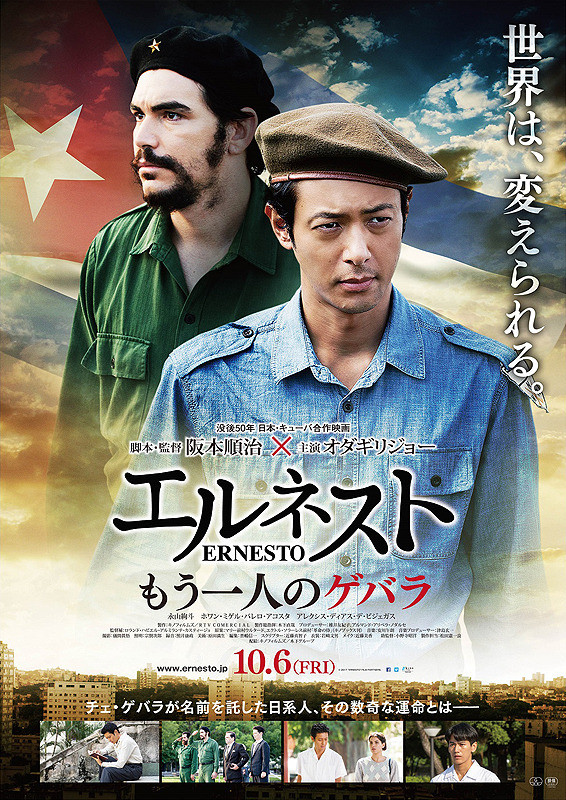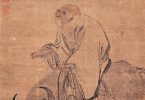“Ernesto”
By: Daniel Otero
A surprising film, reflecting the past and those intense years of the Cold War. The movie was based on a true story about the life of Freddy Maemura-Hurtado. A second-generation Bolivian born to a Japanese father.
The story begins with the gathering of Ernesto ‘Che’ Guevara (the Argentinean freedom fighter), Camilo Cienfuegos, Cuban representatives and the Japanese government in Hiroshima. As they observe the memorial (Asahi Shimbun) where the nuclear holocaust occurred.
‘Che’ is asking about the stone’s epitaph in Japanese. As on the cenotaph it is written, “安らかに眠って下さい 過ちは 繰返しませぬか/please rest in peace, for [we/they] shall not repeat the error.”
‘Che’ clearly answers, “Was it not the United States who dropped the bomb? The War would have ended anyway, one way or another.”
With Japan destroyed after World War II, many Japanese set out to immigrate for better opportunities. Some ended up in the States, while others made it and scattered throughout Central and South America.
The story continues in Cuba, when several young men, including Freddy land in the Jose Marti International Airport, Cuba. Here they’ll begin their studies thanks to a scholarship giving to them by the Cuban government.
Freddy is young and idealistic, believing he can change the world. That’s why he studies medicine, to help the poor and less fortunate.
The film will take this story from 1959 (end of the Revolution), to the post-revolutionary Cuban years and finally ending in 1967.
What’s glorious about this simple drama is the way the Japanese actor (Joe Odagiri) held his own with the Spanish language throughout the entire development of the flick!
The camera amazingly panning in and out between Japan and Cuba. Covering not only this period drama, but parts of Hiroshima and in Cuba: with its capital Havana and in cities like Santa Clara.
Showing what a low-budget but well acted film can do when it’s nicely done.
Whether or not ideals were forced/tipped by the Soviet Union or the United States. Politics aside, Cuba was caught in the middle and Fidel Castro begins to lean more towards Communism after the “Bay of Pigs” invasion.
Freddy will be a witness, but also a direct participant of the “Bay of Pigs” counterattack; in which the revolutionary forces downed two B-26 bomber airplanes.
The viewer will experience in this film the beginning, middle and throughout the 1960s. Plus, those 13-horrific days of the “Cuban Missile Crisis”. When the world was near a nuclear tragedy.
It is this experience and others while he’s in Cuba that will form Freddy’s mind.
Years later, Bolivia suffers a coup-d-tat and the rightist government has taken control, supported by the United States.
Freddy decides he must leave Cuba and go back to Bolivia to do something for his country. Here is when he must decide to abandon his medical studies. But before he is to so, he’s allowed by the Cuban government to do his intern practice.
Freddy with other Bolivian expats will be selected for a Top-secret mission to ‘invade’ and liberate Bolivia. This mission is to be led by ‘Che’ Guevara himself. Freddy with his compatriots are trained and prepared in Cuba for the next two years; before they are off to combat, to start their revolution.
Before the mission is about to take place. The men are called by Guevara to be given code names, just in case they are capture or killed in combat.
When Freddy goes before Guevara, ‘Che’ bestows on this young man the greatest honor of all. ‘Che’ will give Freddy the code-name of ‘ERNESTO, DOCTOR’ (translated to Spanish, ‘ERNESTO, MEDICO’). Ernesto is Guevara’s first name, and Freddy feels totally moved, honored and humbled by the experience.
The flick then moves with them in country and fighting in Bolivia. Here sadly, when betrayed and caught in an ambush, Freddy and his compatriots were killed! Several months later, the same fate will befall on ‘Che’.
There is so much to learn about the historical-timeline throughout this film.
How certain members of a generation were willing to lay down their lives for their principles. Something barely unheard of in our contemporary age.
The final scene is magical, when some of Freddy’s former classmates come to bring him flowers; where his remains are entombed besides Che’s.
This movie is a rear gem and few times these types of stories are done in an international-indie fashion. A film which shouldn’t be only shown in Cuba or Japan, but as a historical reminder and objective lesson in the United States and Russia.
That another Cold War should never be repeated again. Furthermore, justice and equality are for all and not only for the elite.






